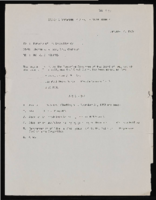Search the Special Collections and Archives Portal
Search Results

Maila Aganon oral history interview: transcript
Date
Archival Collection
Description
Oral history interview with Maila Aganon conducted by Kristel Peralta, Cecilia Winchell, and Stefani Evans on June 10, 2021 for Reflections: The Las Vegas Asian American and Pacific Islander Oral History Project. Maila Aganon discusses her childhood, family upbringing, and immigration to the United States from the Philippines when she was a college student. She shares how her parents moved to Las Vegas first and Maila followed a decade later, investing in real estate and eventually taking up permanent residence. Maila talks about her employment history with Allstate Insurance, Bank of America, AAA, Caesars Entertainment, and finally Aon as a Senior Vice President. She also shares her thoughts on the growth of Las Vegas and the growth of the Asian community and cultural influence within the city. Subjects discussed include: anti-Asian violence; Filipino grocery stores; Filipino foods; remote work.
Text

Nadine Cracraft oral history interview: transcript
Date
Archival Collection
Description
Oral history interview with Nadine Cracraft conducted by Barbara Tabach on November 27, 2017 for the Remembering 1 October Oral History Project. In this interview, Nadine Cracraft discusses the development of her career in child and family therapy after moving to Las Vegas, Nevada in 1991. While describing the work she has done, Cracraft talks about the volunteer counseling services she provided for the survivors of the October 2017 Las Vegas mass shooting. She specifically mentions working with Aria staff members who were struggling with the aftermath of the shooting as well as her time spent working with First Friday to help those impacted by the traumatic event. Throughout the interview, Cracraft explains the different ways people manage their post-traumatic stress disorder and how this knowledge influenced her care of the survivors.
Text

Erma Linda Rivera oral history interview: transcript
Date
Archival Collection
Description
Oral history interview with Erma Linda Rivera conducted by Laurents Bañuelos-Benitez, Nathalie Martinez, Maribel Estrada Calderón, and Barbara Tabach on January 09, 2019 for the Latinx Voices of Southern Nevada Oral History Project. In this interview, Erma Linda Rivera discusses her early life as a grandchild of immigrants. She shares her experiences growing up in a mining town in Arizona. After marrying, both Erma Linda and her husband Jose became federal civil servants. This would lead Erma Linda Rivera to Las Vegas, Nevada in 1984. Prior to retirement, Rivera worked as an regional Equal Employment Opportunity manager. Rivera discusses her career working for the Department of the Interior, sharing how her job helped fuel her passion for social justice. Erma Linda relates the importance of civic involvement in her life. Finally, she reflects on how Henderson, Nevada has changed over the years she has lived there.
Text

Meli Calvo Pulido oral history interview: transcript
Date
Archival Collection
Description
Oral history interview with Meli Calvo Pulido conducted by Laurents Banuelos on November 13, 2018 for the Latinx Voices of Southern Nevada Oral History Project. In this interview, Pulido discusses her early life in Tijuana, Mexico and moving to Las Vegas, Nevada in the mid-1970s. She talks about the challenges she faced as an English as a Second Language (ESL) student, and assisting her parents who did not speak English fluently. Lastly, Pulido describes volunteering for the non-profit organization Project 150, the work the organization does for homeless youth in Las Vegas, and assisting underprivileged students.
Text

Mirtha Rojas oral history interview: transcript
Date
Archival Collection
Description
Oral history interview with Mirtha Rojas conducted by Marcela Rodriguez-Campo on December 6, 2018 the Latinx Voices of Southern Nevada Oral History Project. Mirtha talks about her artistic upbringing in Cuba and how she immigrated to the Florida with her brother. She talks about relocating to Las Vegas in 2000, her membership with the Culinary Workers Union Local 226, and her employment as a guest room attendant and shop steward at the Aria Hotel and Casino.
Text

Arsya Respati oral history interview: transcript
Date
Archival Collection
Description
Oral history interview with Arsya Respati conducted by Madison Chang on December 4, 2021 for Reflections: The Las Vegas Asian American and Pacific Islander Oral History Project. University of Nevada, Las Vegas (UNLV) student Arsya Respati shares his childhood and upbringing in Jakarta, Indonesia and educational background. He discusses his studies at the international BINUS SCHOOL Simprug in Jakarta and his immigration to the United States with his younger brother to pursue the culinary arts at the William F. Harrah College of Hospitality at UNLV. Arsya Respati talks about his relationship with his parents and their daily communication, his "aunty" who has helped him adjust to American culture and homesickness, his Muslim faith and traditions, and his employment. He also shares his views on Indonesian politics and cultural diversity, and the diversity of Las Vegas.
Text

Deryk and Melissa Engelland oral history interview: transcript
Date
Archival Collection
Description
Oral history interview with Deryk and Melissa Engelland conducted by Barbara Tabach on May 23, 2019 for the Remembering 1 October Oral History Project.
Deryk Engelland is a professional hockey player and team spokesperson for the Vegas Golden Knights in Las Vegas. He and his wife, Melissa, discuss the events of the October 1 shooting and how the Golden Knights chose to honor the community that they were representing after this tragic event. Deryk and Melissa Engelland established the Vegas Born Foundation to honor first responders and community heroes, and the couple talks about the organization's accomplishments since its inception.
Subjects discussed include: Las Vegas healing.
Text

Economic Opportunity Board of Clark County (Nev.): memos, agendas, and meeting minutes
Date
Archival Collection
Description
From the Clark County Economic Opportunity Board Records -- Series I. Administrative. This folder contains memos, agendas and minutes from meetings of the Clark County Economic Opportunity Board from January 1970 through February 1970.
Text

Marie Antoinette Antonio oral history interview: transcript
Date
Archival Collection
Description
Oral history interview with Marie Antoinette Antonio conducted by Cecilia Winchell and Stefani Evans on December 4, 2021 for Reflections: The Las Vegas Asian American and Pacific Islander Oral History Project. Marie reflects on her upbringing in Cagayan de Oro, Philippines and her love of music that came from her mother. Marie talks about studying music in college and traveling with her husband to Guam to become a music teacher at a Catholic school before immigrating to San Jose, California. She shares the culture shock they faced adapting to life in the United States and the higher cost of living in California, which caused the couple to move to Las Vegas. Marie discusses her life in Las Vegas, traditions and cultural celebrations she partakes in, and the American Dream.
Text

John Fudenberg oral history interview: transcripts
Date
Archival Collection
Description
Oral history interviews with John Fudenberg conducted by Barbara Tabach and Claytee D. White on May 3, 2018 and May 23, 2018 for the Remembering 1 October Oral History Project. In this interview, John Fudenberg, the coroner for Clark County in Las Vegas, Nevada, gives an account of his experience during the October 1, 2017 mass shooting on the Las Vegas Strip and what his role was during the tumultuous days after the shooting. He explains how he and the staff of the coroner's office prepared for the large number of casualties as well as their arrival at the Route 91 Harvest festival venue. Fudenberg speaks of setting up the Family Assistance Center at the convention center and how it supported the community but also aided the coroner's office in gathering information about the deceased and identifying them. Fudenberg discusses the main job of the Coroner's Office during the first week after the shooting, which was to autopsy the bodies and communicate with the families, as well as the Police Department. He also talks about the emotional impact the shooting and its aftermath had on him and his staff members and the wellness program they implemented, of which trauma yoga and meditation had a large impact.
Text
